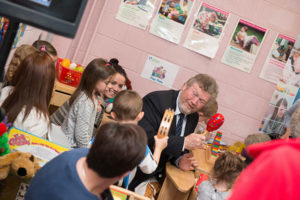With its long record in producing early childhood education graduates, IT Sligo was the appropriate backdrop for the ministerial launch of a major childcare services report following the Cabinet’s recent meeting at Lissadell House.
“This document offers a clear vision for future investment in early years and school-age services,” Dr James Reilly, Minister for Children and Youth Affairs said of the Inter-Departmental report, which put forward options to enhance affordability for parents, improve the quality of services and outcomes for children, and promote greater accessibility in the sector.
It was “the most ambitious, detailed and costed plan for childcare ever produced by Government,” the Minister added.
Since some 300 undergraduates are enrolled in IT Sligo’s four year BA (Hons) in Early Childhood Care and Education course, and given the recent introduction of a Masters of Arts in Leadership in Early Childhood Care and Education, it was the ideal setting for the report’s publication, Dr Perry Share, Head of the School of Business and Social Sciences, said.
“Early childhood care and education, if it is good quality, has substantial and long term benefit to all the children of this country,” he said. “It is really about investing in our children and the country’s future.”
The Minister took the opportunity to see a purpose-designed pre-school education facility at the Institute. The focus of the“early years childhood care and education skills laboratory” is on undergraduate use. There, undergraduates are taught skills that are needed to nurture vital early years’ learning abilities
Dr Breda McTaggart, Head of the Department of Social Science, said: “IT Sligo’s early childhood degree programme is probably one of the very few in the country that has a designated learning space for students to develop the professional skills necessary to educate and care for the younger child.
“We have two such spaces indoors and another, which will be novel in itself because it is outdoor, will open in September.”
Emphasing that children learn through playing, she explained: “The facilities here are not about ‘play’ but, rather, to teach our students how to use them to unlock children’s early years potential, for instance in developing early mathematics and communications skills or getting to grips with and learning from our natural environment.”
The BA course is heavily in demand and attracts an intake of more than 70 students at the start of each academic year.
During the programme students develop a comprehensive knowledge of child development and child psychology and skills in areas such as children’s play, creative studies, care, education, children’s literature, sociology and social policy. There are also two external placements, one of which may be abroad.
Dr Share underlined the importance of the Early Childhood Care and Education programmes’ international aspects, which involve active links with colleges in Canada, USA, Scandinavia and elsewhere in the EU. “These ensure that our programmes are at the forefront of international theory and practice.”
He added: “Significantly, also, our MA in Leadership in ECCE is unique in Ireland and one of the few masters programmes in the world that focus on this aspect of early years education.
“It is specifically aimed at helping to develop the leaders of the early years sector in the future – the very people who will help to make policy documents such as this Inter-Departmental Report a reality.”

Mr Tambourine Man shows Dr Reilly how it’s done

Dr James Reilly, Minister for Children and Youth Affairs, with Dr Perry Share, Head of School of Business & Social Sciences, Dr Breda McTaggart, Head of Department of Social Science and Tom Reilly, Head of Strategy and Planning, at the launch of a major childcare services report at IT Sligo